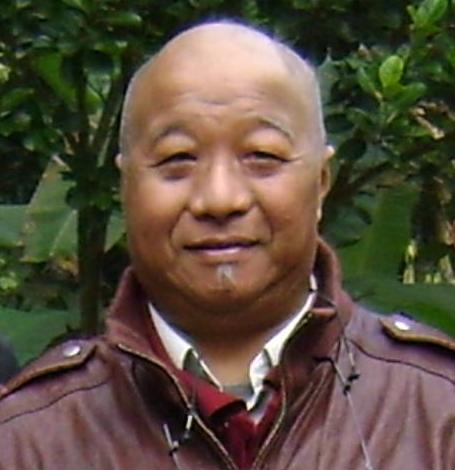Chin National Day: Interview With Salai Kipp Kho Lian

[CG Note: Salai Kipp Kho Lian, one of the founding members of the Chin Forum, was born in Meiktila, Burma. While studying Architecture at the Rangoon Institute of Technology he was detained by the Burmese military junta in 1972 for 13 months for taking part as a signatory of the Proposal of Chin Youth demanding Federal Democracy System for the country. In 1974, he took part during the U Thant funeral Strike and was arrested again along with 10,000 other demonstrators inside the Rangoon University campus. He took part actively in organizing the Thakhin Ko Daw Hmaing Centennial Strike in 1976.
He eventually fled to Germany in 1986 and was granted a political asylum by the German authority in 1989. Since arriving in Germany, Salai Kipp played vital roles in the formations of Burma Büro (Köln), European Burmese Association (Hamburg), Chin Community (Germany), Chin Forum (Ottawa) etc. During the Chin Forum Managing Board meetings at Frankfurt am Main in Germany on 17-19 July, he was unanimously elected by the Board as the Coordinator. He is residing at Hamburg, Germany since 1986.
Van Biak Thang of Chinland Guardian talked to Salai Kipp Kho Lian about the Chin National Day, its historical background and implications in this generation.]
Chinland Guardian: What are the significant features of Chin National Day and its celebration?
Salai Kipp Kho Lian: Burma’s Independence Day (4th January) and Union Day (12th February) followed by the Chin National Day on the 20th February are all historical landmarks which should not be viewed as isolated events. These three historical important days are deeply interconnected. The Chins, along with Kachins, Shans and Burmans all signed the Panglong Agreement on 12 February 1947 because we all wanted Independence – it is a proof that we did not wished to be a subject of any kind of colony. We always want to be an equal partner in the family of nations over the world.
Once a Burman friend of mine asked me a very naive question: “Salai Kipp, I believe you Chins are not for Independence and will be content with autonomy, am I right?” My blunt answer was “Wrong, we always want Independence. For that we have a historical proof. Look we Chins are one of the signatory of the Panglong Agreement. Was it not a concrete proof that we opted for Independence rather than remain a slave nation? Was it not the reason we joined the Union of Burma as one of the co-independence partner?”
Again to be truly Independence, the political powers must be vested in their hands of the Chin peoples – not in one single person known as a Bawi or Lal or Ukpi. For this reason we abolished the ancient autocratic system of Chinland on the 20th February 1948 at a mass conference in Falam right after the Union of Burma gained Independence. In that sense, 20th February is marked as the day the political power in Chinland was handed over from autocratic rulers to the Chin people – the day the Chin people first enjoyed true freedom and democracy.
These are the significant features of Chin National Day.
Chinland Guardian: So, it was a political purpose that the Chins wanted to achieve in unity at the mass conference or were they fighting against the autocratic chieftainship?
Salai Kho Kipp Lian: It is not the point whether or not the Chins like the chieftainship (or Bawi / Ukpi system). At that time, we were about to establish a modern nation called Union of Burma. Our ancient administrative system was already out of date and our rulers have no knowledge of modern politics. Even during the signing of Panglong Agreement, the three Chiefs who signed the said Agreement failed to secure a State for the Chins. Instead, the Chin country became a division of Burma though we deserve a State of our own. The Chiefs at that time were also quite aware that the modern era had come and that they were incompetent to rule the land further.
When it comes to colonialism it is abhorred by all nations on this planet earth – not only by the Chins. No nation has ever wanted to be a slave nation. We will always reject any kind of colonialism – internal or external one.
Chinland Guardian: Is there any difference in the meaning and importance of celebrating Chin National Day between today and before? And why is it important to celebrate this day today?
Salai Kipp Kho Lian: Basically, I don’t see any difference. But given the fact that all the nationalities of the Union of Burma – including the Burmans – are struggling to restore freedom and democracy, we need to emphasize that the “Second Struggle for Independence” is made necessary because after Burma gained Independence following the “first struggle”, the fruits of Independence and freedom have not been enjoyed by the ethnic nationalities.
Celebrating the auspicious day in the exiles, we should always remind our Burman brothers that it has not been in their own interest to deprive the rights and freedom of other co-independence ethnic states. Our history has already proved that depriving the rights of the ethnic nationalities, the Burmans themselves end up becoming slaves under the military boots.
For the future Union to prosper peacefully, political powers must be distributed equally among all the nationalities. Ignoring this fact will only prolong the sufferings of the peoples – including the Burmans.
Chinland Guardian: Tell us more about the history of Chin National Day.
Salai Kipp Kho Lian: The foundation stones of freedom, democracy and unity of the Chin peoples have been laid down on the 20th February in Falam, where the first ever conference of peoples of all over Chinland was convened. So, historically saying, Falam is the Panglong of the Chin peoples. The national capital could be anywhere else but this historical fact cannot be changed or moved. For this reason when the future Federal Democratic Union of Burma is established, our Chin National Legislative Assembly should be well placed in Falam as an honour to the aspirations of our forefathers for freedom, democracy and unity. I hope this point would be acceptable to all Chin peoples and all respectable leaders.
Chinland Guardian: So, we could clearly see that the unity of the Chins could be seen on several occasions for a common cause. For instance, more than 5000 people were said to have travelled on foot for days and weeks from different areas in Chinland to come to a mass conference in Falam. Nowadays, the Chin people have migrated to different countries in the world due to brutalities and repression of the military regime for decades. In your opinion, what kind of reflections and lessons can we, the Chins today, learn based on the unity and collaboration of the Chins in the past?
Salai Kipp Kho Lian: Currently the Chins are regarded by observers as the most united people. Our forefathers have far-sightedly laid down the foundation stones of Chin unity at Falam in 1948. I hope the present political and religious leaders and also the leaders of the Chin civil societies would uphold and continuously strengthen the unity. Needless to say, with no unity, our struggle is doomed.
The Chin exodus following the Four Eights Revolution is significant in that they all formed up their own civil societies and religious institutions in the exiles – in the countries of their domicile – to further the Chin cause. Right now there are already around 400 Chin university students in various countries in the world.
By the time the Union of Burma gained Independence the Chin MPs were asked in the Parliament (as the poorest and most backward region in the Union) what the Chins would contribute for the Union. A Chin MP replied: “We will produce soldiers.” Soldiers did we produce and many Chin soldiers laid down their lives to protect the Union, leaving behind their beloved families as orphans and widows. Nowadays we are confidently saying: “The Chins will produce PhDs.”
The Chin diaspora is already contributing a lot in terms of sending money to the needy back home and financing development projects in Chin State. More contribution is to be expected. So, in a nutshell, the Chin exodus is part of our nation building process – not only for us, the Chins, but also for the good of the whole Union.
This is the Chin revolution – knowledge revolution, a revolution to hasten the process of upgrading our human resources.
Chinland Guardian: Thank you for your time and answers.
Salai Kipp Kho Lian: Thanks for the interview.




